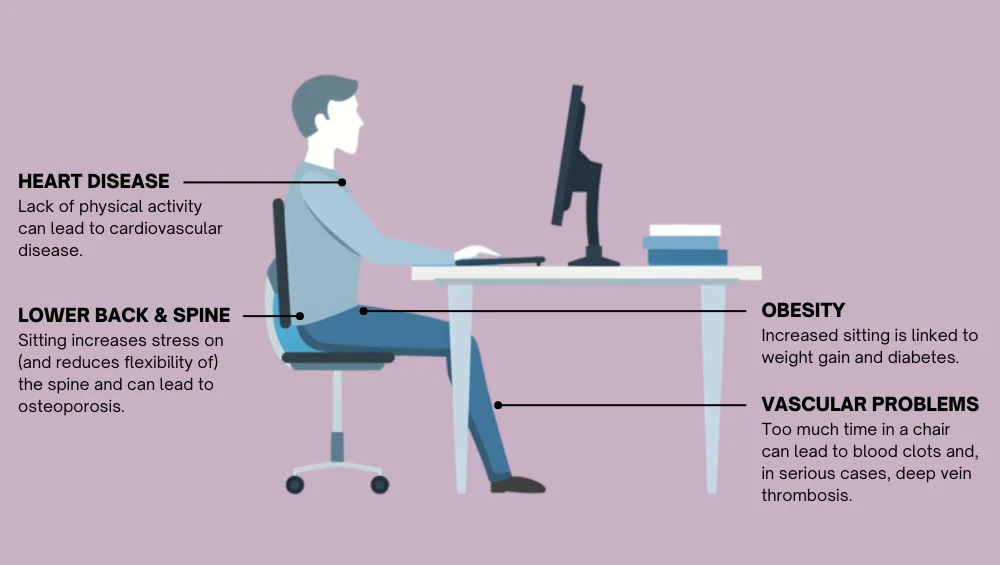Can Prolonged Sitting Put Your Health at Risk?
- Updated on: Aug 8, 2024
- 4 min Read
- Published on Apr 6, 2023


Image Source: Pexels
Sitting for long periods of time has become the norm in our modern lives. Whether it’s at a desk all day or in front of the TV after dinner, many of us spend a lot of time sitting down. But did you know that this habit can put your health at risk? Prolonged sitting can lead to several health issues, such as a higher risk of obesity, heart disease, and even cancer. In this article, we’ll explore why sitting for too long can be dangerous and what you can do to reduce your risk. By understanding the risks and taking steps to reduce them, you can ensure that your lifestyle is as healthy as possible.
What are the health risks of prolonged sitting?
Prolonged sitting can have serious effects on our health. Studies have shown that those who sit for long periods of time are more likely to be overweight and obese, have an increased risk of heart disease, and are more likely to develop certain types of cancer.
The risk of obesity is especially concerning. Sitting for long periods of time can lead to a decrease in physical activity, which can lead to weight gain and an increased risk of obesity. To keep track of your weight and health, you can use a BMI Calculator. This is especially true for those who work in jobs that require long hours of sitting.
In addition to the risk of obesity, prolonged sitting can also increase the risk of heart disease. This is because sitting for long periods of time can decrease blood circulation, which can lead to an increased risk of heart attack and stroke.
Finally, prolonged sitting can also increase the risk of certain types of cancer. Studies have shown that those who sit for long periods of time are more likely to develop colorectal and endometrial cancer.

How do you measure the amount of time spent sitting?
The amount of time spent sitting can be measured in a variety of ways. One of the most common is to measure the amount of time spent sitting in a day. This can be done by tracking the time spent sitting down at work, at home, or in other activities.
Another way to measure the amount of time spent sitting is to measure the amount of time spent in sedentary activities. Sedentary activities include watching television, using the computer, and other activities that involve minimal physical activity.
The last way to measure the amount of time spent sitting is to measure the amount of time spent in an upright position. This can be done by tracking the amount of time spent standing or walking. You can then subtract this amount of time from 24 hours and estimate the amount of time spent idle.
How can you reduce the amount of time spent sitting?
There are several ways to reduce the amount of time spent sitting. One of the most effective is to get up and move around throughout the day. This can be done by taking regular breaks from sitting, and instead, taking a walk or stretching.
With this in mind, it is imperative that you make sure your workspace is conducive to standing. This usually involves setting up your workspace so that you can stand and work comfortably at the same time. Consider investing in a standing desk or a laptop stand. You may also upgrade to a sciatica chair to ensure you are doing less damage while sitting at your desk.
Finally, it’s also important to make sure that you’re getting enough physical activity throughout the day. This can include taking regular walks, doing light exercise, or engaging in other physical activities.
What are the best exercises to do while sitting?
There are several exercises that can be done while sitting that can help to reduce the amount of time spent sitting. These include calf raises, leg extensions, ankle circles, and arm circles.
- Calf raises can help to improve circulation and strengthen the calves. To do this exercise, sit in a chair and lift your heels off the ground while keeping your toes on the ground. Hold this position for a few seconds before lowering your heels back to the ground.
- Leg extensions can also help to improve circulation and strengthen the legs. To do this exercise, sit in a chair with your feet flat on the ground. Lift your right leg up and hold it for a few seconds before lowering it back to the ground. Repeat this exercise with your left leg.
- Ankle circles can help to improve circulation and flexibility in the ankles. To do this exercise, sit in a chair and place your feet flat on the ground. Lift one foot off the ground and make circles with your ankle in a clockwise direction. Repeat this exercise with your other foot.
- Arm circles can help to improve circulation and strengthen the arms. To do this exercise, sit in a chair and place your hands on your thighs. Lift your hands off your thighs and make circles with your arms in a clockwise direction.
What other lifestyle changes can you make to reduce your risk?
In addition to reducing the amount of time spent sitting, there are several other lifestyle changes you can make to reduce your risk of health problems. This includes getting enough sleep, eating a healthy diet, and exercising at least 30 minutes per day 5 days per week.
Conclusion
Prolonged sitting can be dangerous for your health. It can increase the risk of obesity, heart disease, and certain types of cancer. It’s important to understand the risks and take steps to reduce them. By understanding the risks and taking steps to address them, you can ensure that your lifestyle is as healthy as possible, regardless of how much you sit throughout the day.












